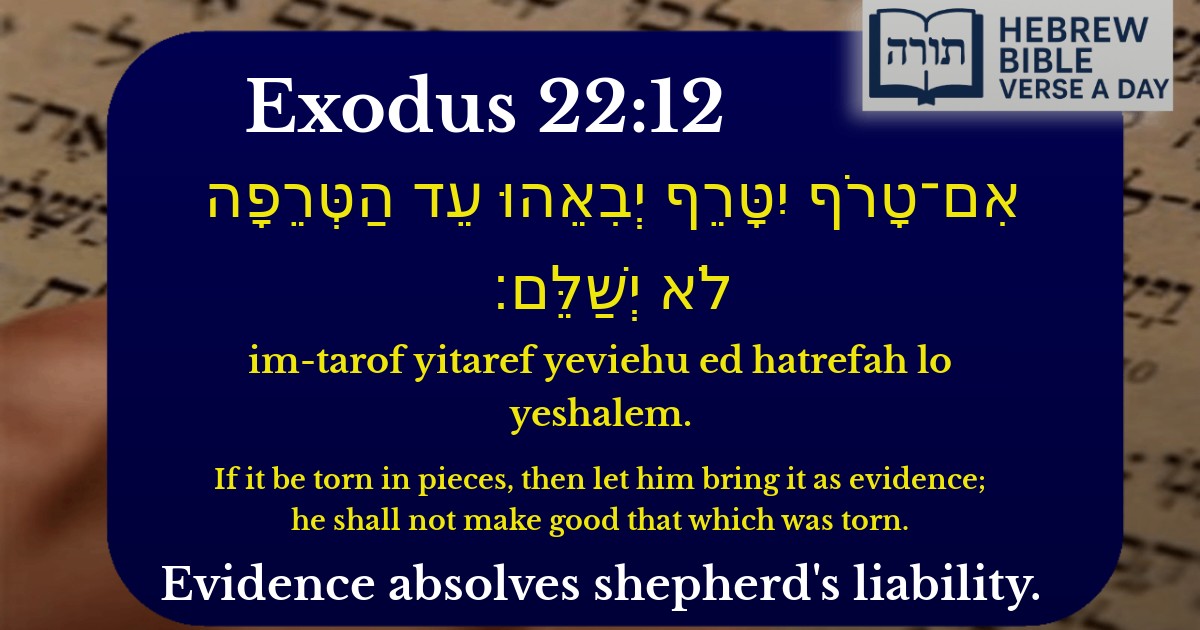Frequently Asked Questions
Q: What does Exodus 22:12 mean about an animal being torn by a wild beast?
A: Exodus 22:12 discusses the law of a shomer (guardian) who is watching someone else's animal. If the animal is torn by a wild beast, the guardian must bring the torn remains as evidence to prove it wasn't due to his negligence. According to Rashi, this verse teaches that the guardian is exempt from paying compensation if he can provide this proof.
Q: Why is bringing evidence important in Exodus 22:12?
A: Bringing evidence (the torn animal) is crucial because it shows the guardian acted responsibly. The Talmud (Bava Metzia 34b) explains that without proof, the guardian might be suspected of negligence or theft. The Torah requires evidence to ensure fair judgment and protect the guardian from false accusations.
Q: What can we learn from Exodus 22:12 about responsibility?
A: This verse teaches the importance of accountability when entrusted with another's property. The Rambam (Hilchot Sheilah u'Pikadon 3:1) derives from here that a shomer must take reasonable precautions. If an unavoidable incident occurs (like an animal attack), providing evidence demonstrates honesty and fulfills one's Torah obligation.
Q: How does Exodus 22:12 apply to modern situations?
A: The principle applies whenever we're responsible for others' belongings. The Sefer HaChinuch (Mitzvah 55) explains this teaches honesty in financial matters. For example, if borrowing an item that gets damaged due to circumstances beyond your control, you should document what happened - just like bringing the 'torn evidence' in biblical times.
Q: Why does the Torah specify 'torn by a wild beast' in this law?
A: The Midrash (Mechilta d'Rabbi Yishmael) notes this specifies an unavoidable circumstance (ones). Unlike negligence where the shomer would pay, a wild animal attack is beyond human control. The Torah distinguishes between different types of incidents to teach fair judgment - a principle later expanded in Talmudic tort law (Bava Kamma).


Context in Torah
The verse (Shemot/Exodus 22:12) appears in the section of Mishpatim, which details laws concerning financial and civil responsibilities, particularly those of a shomer (a guardian or custodian of another's property). This specific verse addresses the case of a shomer chinam (an unpaid guardian) who is entrusted with an animal that is subsequently torn apart by a wild beast.
Literal Interpretation (Peshat)
Rashi explains that if an animal under the care of an unpaid guardian is terefah (torn by a wild beast), the guardian is exempt from compensating the owner—provided he brings ed haterefah (evidence of the tearing) to substantiate his claim. This evidence could be the remains of the animal or reliable witnesses who saw the attack.
Legal Principles (Halachah)
Moral and Ethical Lessons (Derash)
The Midrash Tanchuma (Mishpatim 10) connects this law to broader themes of trust and responsibility. Even though the guardian is exempt, he must still act with integrity by presenting truthful evidence. This underscores the Torah’s emphasis on honesty in financial matters, even when one is not legally obligated.
Symbolic Interpretation (Sod)
The Zohar (Mishpatim 124a) alludes to a deeper spiritual meaning: the "torn animal" represents a soul damaged by external forces (such as negative influences). The "evidence" symbolizes sincere repentance (teshuvah), which can exempt a person from divine judgment if they demonstrate genuine remorse and corrective action.